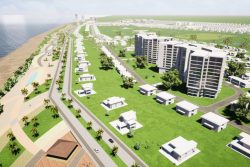Dear Editor
Finally, there appears to be wide agreement by diverse sections of our citizenry that the Guyana Police Force needs to be reformed.
More than two decades ago, on January 17, 1999, “ROAR against Crime” was launched in reference to the very need. But we cautioned: “We should not be stampeded into taking ad hoc initiatives without formulating a plan that addresses the need to make fundamental changes in its structural base – or the malfunctions will continue unabated. “Modernisation” of the Force must not be equated simply with improved weaponry”. In addition to over twenty specific recommendations, four medium-term structural changes were suggested, which are still relevant.
Recommendation #1 was “Balancing the Force”. It echoed the conclusion of Dr Cynthia Enloe, who studied Guyana first-hand after a worldwide survey in her essay, “Police and Military in the Resolu-tion of Ethnic Conflict”. “Any lasting resolution of ethnic conflict may require that the distribution of political authority and influence in the society be basically reordered and that, as part of that reordering, the Police and military be ethnically reconstituted at the top and the bottom. Resolution of inter-ethnic conflict will be tenuous if the security that is achieved is merely state security and not security for each of the state’s resident communities.”
Recommendation #2 was, “Decentralising the Force”. We showed that unlike the Police forces of most low crime jurisdictions that were decentralised, the GPF was heavily centralised due to the historical imperative of the colonial power to suppress rather than to protect the local population. This authoritarian orientation is rooted in the concentration of all Police strength to protect the strategic centre. We suggested in 1999: “The centralised structure of the GPF has led to widespread ineffectiveness and dislocations. Administrative effectiveness is not the sole test of police competence, which should rather be the greatest effort in the promotion of the Rule of Law and entrenching citizens’ security. We recommend that the GPF be split into six separate forces: Metro-GT, Demerara, Berbice, Essequibo, Rupununi and a Central Force (like an FBI). Each Force would have its own Commissioner and its own command structure. The Central Force wound oversee a central Forensic lab, the Anti-drug Unit, Intelligence and international co-ordination”. We note the timid move by APNU/AFC towards decentralisation in appointing a Commander for each of the 10 regions. This does not go far enough.
Recommendation #3: “Supplementing the Force”: The first part proposed “Com-munity Policing” and argued that minor crimes in communities if unpunished, led to major crimes and massive social breakdown. The goal was to allow neighbourhoods to police themselves and reduce crime. The role of police through this type of “community policing” is to reduce fear through foot patrol, maintaining order, and the judicious use of officers’ discretion. In so doing, they would only be responding to the previously unacknowledged demand in poor and at-risk communities for the same sense of lawfulness enjoyed in wealthy areas.
Recommendation #4: Streamlining the Force: We pointed out that, “Only approximately 30% of the GPF are engaged in crime detection and prevention. We elaborated on all the various non-policing elements that could be farmed out – especially to civilian staff, thus freeing up personnel trained for real police work. We asked: Does immigration really qualify as a “policing” task? Shouldn’t each Police Force have its own Prosecutors Office manned by high calibre qualified permanent staff?
The APNU/AFC accepted the recommendation on hiving off Immigration but much more needs to be done to make the police focusing only on policing.
Sincerely,
Ravi Dev




